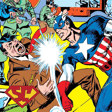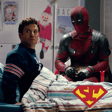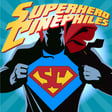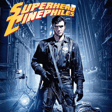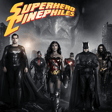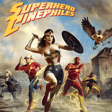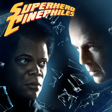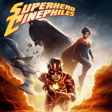Become a Creator today!Start creating today - Share your story with the world!
Start for free
00:00:00
00:00:01

Dr. Strange (1978)
In this episode, we unearth the largely unknown made-for-TV Dr. Strange movie from 1978. Though the effects are poor and the music laughable, overall we found it’s actually a pretty serious effort! We also address the recent superhero-bashing from Martin Scorsese and Francis Ford Coppola.
---
Send in a voice message: https://anchor.fm/superherocinephiles/message
Recommended
Transcript
Alchemy: Science or Magic?
00:00:26
Speaker
The ability to take the fundamental forces of the universe and direct them, control them with the will. Alchemy, sorcery, magic, or science. It's been called by many names. I don't think I'm ready for that. I think you are. You're telling me you're a sorcerer. And my father, was he like you? No. He gave me the ring.
00:00:59
Speaker
We did. I used to feel I was the one meant to die in that accident, and somehow it was my fault. I believe the accident was intended for you. Your parents died to protect you. Protect me? And my latent talents? Those talents are very rare indeed. Well, I don't think I want to know about them. I came here to try and help a patient of mine.
00:01:34
Speaker
If we're going to help her, we should do so quickly.
Introduction to Superhero Cinephiles
00:01:59
Speaker
Welcome to the Superhero Cinephiles podcast. I'm one of your co-hosts, Perry Constantine. And I am your other host, Derek Ferguson. How you doing today, Derek? I'm doing quite well, sir, adjusting to this last God forsaken daylight savings time, which I hate with the passion of 1,000 fiery suns. Yeah, it screwed up our recording time a little bit because I messaged you. They're like, isn't it supposed to be another hour? And I'm like, oh, yeah, you guys still have daylight savings times over there.
00:02:29
Speaker
Yeah, but I was sitting in front of my computer anyway. So I said, yeah, you know, no big deal. You know, I said, if you're ready to go, listen, I'm ready to go, too. And so here we are. But you've got something to announce.
Derek's New Anthology Release
00:02:44
Speaker
You got a new book that just came out. Yes. Pro-day productions. Dylan, The Odd Jobs came out early. What was it? This is Tuesday. Yes. So it came out last week.
00:02:58
Speaker
And for those of you who have been following my Dylan series, this one is an unusual anthology in that the stories in this book were written by other people. One was one was written by Eric Fromm, one was written by Russ Anderson, Junior, one was written by Joel Jenkins, and one was written by Mark Bousquet. All guys who, you know, I'm known for years, they're extremely talented writers.
00:03:28
Speaker
and they long wanted to do a Dylan story. So I said, well, listen, write it up and I will bludgeon Tommy Hancock into submission and we'll publish it. And we did. And it's out now with the cover, of course, by Sean E. Ollie and from the initial reactions.
00:03:47
Speaker
But it's, you know, people are enjoying it a lot, especially since when Tommy first put it out, you know, the e-book was only 99 cents. So it very quickly shot up to, you know. So, yeah, so it's doing well. So people go out and pick it up. And I hope you enjoy it. And if you want any more information about Dylan and the other books in the series,
00:04:13
Speaker
Well, there is a Dylan website that I have up. As a matter of fact, I have just given it a facelift. If you, you know, I had, I had been neglecting it for a while because I was tired. It was some other stuff. But I said, once this book comes out and next month, there's going to be another Dylan book out the Dylan annual collection for this year, which is going to have all Dylan Christmas stories.
00:04:41
Speaker
Oh, OK. So you didn't have any of you. So you didn't write any of the stories in the odd jobs then. I did not write any of the stories in the odd jobs. I did not. The only thing I did, Eric Frome's story, Dylan and the City of Stone. I may have added a sentence here and there, but that was for the purposes of continuity, just to make sure that the events of that story job with
00:05:06
Speaker
events and other stories. But, you know, but that's all I did. Yeah, I mean, these guys, you know, they wanted to go. So I said, hey, have at it. And and they did. And I'm happy to say that I couldn't be more proud of the stories that's in there, because you know what? It's a really odd feeling reading about characters that you created and seeing how other people see them. Right. Which is which is giving me a whole new perspective on my own characters.
00:05:36
Speaker
So it's really, it's, you know, not only from a creative standpoint, well, not only from an entertainment standpoint that I was entertained reading it, but from a creative standpoint, it also gave me an insight into my own creations, which is very exciting.
00:05:55
Speaker
Prospect and I hope that for you other writers out there I hope that you get that same opportunity So you know exactly what I'm talking about it when I'm feeling so with the Dylan novels Did you I remember they used to be through pulp work press have all of them now been re-released through pro se Yeah, yeah, all of them have been re-released through pros ad because I did the what I
00:06:24
Speaker
OK, there was like a whole bunch of novelts and novellas. They weren't full novels, but they were, you know, kind of substantial. And I just put them into the first Dylan annual collection. OK, so stuff like The Pirates of Zonira. You know, yeah, you know, that was originally published as its own novel, even though it was kind of slim. So I stuck it in there. And yeah, the.
00:06:53
Speaker
Dylan and Legend of the Golden Bell, The Voice of Odin, you know, all of those have been reissued through Prose and all of them with new covers designed by Sean Ali and the Dylan logo provided by, of course, by you. Happy to do it by that, by the way, too. Yeah, beautiful logo. Yeah, all of it. And
00:07:19
Speaker
The Dillon Annual Collections, they're going to be stories that I originally presented as serials on my Patreon site. Every month, once a month, there's a new chapter. And then at the end of the year, I collect it along with what other Dillon stuff that I've done during that year. And I put it all into one collection. Now, these Christmas stories, the stories that have appeared
00:07:46
Speaker
elsewhere but I wanted to put them all together in one book because like I said they were scared. My whole purpose of consolidating all the dealing stuff into one book so people wouldn't have to go searching all over the place and like five different websites or you know they got to go to Amazon and download
00:08:06
Speaker
or five books and you know to get them all you know this way if you get the annual collections you've got all of the stories and novelettes and then just gotta get the novels and you're done right good idea if that makes sense yeah it makes a lot of sense uh so now today we're talking about your pick which is kind of an interesting one uh the 1978 dr strange tv movie
1970s Marvel TV Movies
00:08:34
Speaker
Yeah, yeah. This is a movie keeping in line with our mission statement, at least for these initial
00:08:51
Speaker
These initial movies that we're covering, we're covering some movies that we think are seminal touchstones in superhero movie cinema.
00:09:05
Speaker
One of those movies I wanted to touch on, not only because it was like the first time we saw Dr. Strange in live action, but it was all part of that thing because Marvel was pretty big on TV during the 70s. They had the whole TV show. They had the Captain America movies.
00:09:27
Speaker
There was Spider-Man, there was a couple of Daredevil movies that was made. There was Daredevil appeared in one of the Hulk TV movies. Thank you very much. I always get that confused. Yeah, Rex Smith, I believe, played Daredevil. Yeah, it was in Trial of the Incredible Hulk. Trial of the Incredible Hulk, yeah. Thor appeared in one of those Hulk movies as well. Yeah, yeah, Return of the Incredible Hulk.
00:09:58
Speaker
Yeah, so Marvel was pretty active. Yeah, I think it was. So Marvel was pretty active on our TV screens during the 1970s. And Dr. Strange, while it's been overlooked by a lot of people, to me, it actually stands out for a number of reasons in that, first of all, you have to act.
00:10:28
Speaker
especially from what's the name, Jessica Walter, who most people will know from Arrested Development. That surprised me because I know Jessica Walter. I know her from Arrested Development. I know her from Archer. And when I saw the name in the credits, I'm like, that name sounds really familiar. I'm like, why can't I place that name? And then when she came on screen, I'm like, it's Lucille Bluth.
00:10:55
Speaker
Yeah, I imagine people say, oh my God, it's her, you know, because I don't think people realize how long she's been around. And you know, I gotta say, she looks really good in this movie. Oh man, she looks fantastic in this. Listen.
00:11:11
Speaker
She's one of those babes that, yeah, if she came to me and she talked about, well, listen, I want you to turn evil, and you can have all of this. If you turn evil, I'd have to give it some serious consideration. Yeah, yeah.
00:11:25
Speaker
Yeah, she does. During the course of the movie, she tries us to do Stephen Strange with blatant sexual favors. If he'll, you know, just come over to her side, you know, and and, you know, like I'm sitting there and I'm watching, I'm saying, you know, man, listen, I don't want you to do it because you're a good guy. But if you do do it, I understand. I understand.
Marvel's TV Deals and Challenges
00:11:47
Speaker
Yeah.
00:11:49
Speaker
It's just cool. Yeah, okay. I completely understand but the whole reason this movie came about was because Marvel had a deal with CBS so they had like the deal for the Incredible Hulk TV series which started off with the TV movie a spider-man which also started off with a TV movie and then followed both of those were followed by TV series and
00:12:12
Speaker
which, you know, Incredible Hulk became, you know, like a cultural touchstone, whereas Spider-Man kinda didn't. And then they also did Doctor Strange, which was supposed to be a backdoor pilot, and the two Captain America ones, there was, you know, Captain America, and then there was the sequel, I think it was like Death 2 Soon or something like that, where he had the plastic shield.
00:12:40
Speaker
Yeah, I think that was the one where Christopher Lee played the bad guy, if I'm not mistaken. Oh, OK.
00:12:46
Speaker
Yeah, I think Christopher Lee played the bad guy. Yeah, but that was the one where he actually played Steve Rogers Jr., the son of the original Captain America. Right, right. And that was the whole deal with him. So which I actually thought it was kind of clever that they said, OK, well, you know something, this is going to give him the plastic shield and everything like that. And he had like a completely different origin because they gave him a derivative of the super soldier Cyril called Flag.
00:13:14
Speaker
Right. And they gave them, they said, well, since you've got your father's DNA, this flag is a refined version of the original formula that's just going to kickstart your DNA and give you the same abilities your father had. And yeah, so I thought that that was pretty clever. But yeah, you're right. This was part of that whole package. And as you so accurately point out,
00:13:36
Speaker
Incredible Hulk went on to become a cultural milestone, which is why we still talk about it today and we don't talk about the image of Spider-Man, which, you know. We even Stan Lee hated that show. And Stan Lee hates like none of the Marvel adaptations, but he hated the Spider-Man TV show.
00:13:54
Speaker
Yeah, yeah, and we're good. I mean, you know, like the first season, it wasn't that bad. But then when they had put the belt on the outside and they gave him the one web shooter and everything, and it was so obvious that it was a stuntman that was in a costume and it wasn't the actor Nicholas Hammond. You know, they couldn't even be bothered to try to find a guy that was
00:14:16
Speaker
that fitted his height and his, you know, general build. It was just it was just sad. It wasn't like Incredible Hulk, which did have Bixby going for it, who put his own creative input into it because he really enjoyed the series and he enjoyed what he was doing. And he had the clout that he could, you know, say, OK, well, I want this done. I want this done. I want, you know, OK, we change that script and change this. So
00:14:41
Speaker
You know, we did have him, you know, we had nobody in the Spider-Man series that had that kind of clout. So it dies with a merciful death, thank God. Yeah, and they also had Aunt May played by like a different actress in every single episode.
00:14:58
Speaker
Yeah, yeah, yeah, I mean, they, Spider-Man was something that I get the feeling that they thought was a good idea at the time. And for those of you who are listening to this, you have to remember that this was back in the time when superhero stuff was really, was thought of as being something for kids. Well, you know, I looked up the, yeah, I looked up the dates because I was curious when I saw the year this came out. And this actually came out a few months before the Superman, the movie.
00:15:28
Speaker
Yeah, which to me accounts for, but see, that was one of the things about Dr. Strange that I wanted to touch on. Considering that this was the 70s, this was a pretty mature look at the character. Matter of fact, we didn't even need the costumes. You could've just been a guy.
00:15:51
Speaker
That is my biggest criticism of this movie, is that you really don't need the costume. And when you put a minute at the end, it just feels so out of place. Yeah, yeah, because, okay, up until the moment that we got, although I do have to admit, it's again, going back to how I would jump on the bandwagon and Jessica Walter asked me to turn it evil. She gave him a far better costume than John Pills. You know, she had him look like a pimp.
00:16:21
Speaker
You know, and that's the thing his the costume that she gives him with the black robes and everything and the necklaces That looked really good. And I'm like, yeah, you know just stuck with that. There was no reason to change it Now that was a cool ass costume. Like I said, yeah You know, like you said he got the mr. T gold chains around his neck and he's got the gold armbands and the black and red robes I said now see now he looks like a source of
00:16:46
Speaker
He was like, so that costume, that costume that Lindmer puts him in, I said, what the hell is this shit? You know, it just, it feels so out of place, especially because the, and the cost, the, the ironic thing is that the costume is even brighter colors than his costume in the comics. Yeah. Yeah. But the costume that Jessica Walter gives him that worked for me. And they had just kept them in that.
00:17:11
Speaker
That would have worked for me. Yeah, definitely. But that other thing that they give them, it looks like a pair of, I don't know, it looks like underoos. I'm sorry, that looks like something that a kid would do. That looks like something like a kid would wear for Halloween. Well, did you ever read the Doctor Strange run that Warren Ellis did in the, I want to say, mid-late 90s? Probably not.
00:17:34
Speaker
All right, well he had Dr. Strange in kind of a more street closed look where his cape was actually like became like a trench coat type thing. Yeah. And basically it was just where, so that was like his main outfit was it was just kind of like more like magic inspired street clothes. And I think that kind of look would have worked really well for a series like this.
00:17:57
Speaker
Yeah, because there's a scene where he's walking down the street and he's dressed like all in black. He's got like a black jacket, a black turtleneck. And I said, no, something for this movie that could have worked with him through the whole thing. They didn't have to put him in a costume at, you know, at all, because when they do, it's kind of like an afterthought. Like they said, oh, shit. Right. So this is supposed to be a superhero type of thing. Whereas up until then, what we've got is pretty much like a horror type
00:18:26
Speaker
Uh, thing, you know, uh, this doctor is more, uh, is, is more of a horror type movie than it is a superhero. It is. Yeah. It's very much in that like urban fantasy vein that would develop. Right. That's what I'm looking for. When you, when you talk about, um,
00:18:48
Speaker
What's that series that everybody's so crazy about? You know, like the Dresden Files and stuff like that. Yeah. OK, that's sort of urban fantasy. That's right. This is more like it's more like an urban fantasy than a superhero thing until we get to the end and they stick them in that ridiculous costume, which, like I said, seemed to me too much like an afterthought. Like they were saying, oh, well, he's supposed to be a superhero, so let's stick him in a costume, which they really have to do. But
00:19:14
Speaker
Speaking of which, I have to give this guy credit, Peter Hooten. I never heard of him before. I've never heard of him since. I have no idea if he acted anything like that. But I like him because this guy looks like he stepped right out of the comic books.
00:19:29
Speaker
Yeah. I mean, his hair's a little bit too curly, but other than that, he looks really much like the part. Yeah, yeah. I mean, that's what gets me. He looks like, wow. I say, you know what? OK, he sells me on being Dr. Strange, and he's got that nice voice. He's got a voice that sounds like he's like a singer or something like that.
00:19:45
Speaker
Maybe that's where he found him and I have no idea. Well, he's actually been like a B actor mostly. So I'm looking him up right now and he's still alive. He came. He was in a movie called Soul Eater about two years ago. And he was in the original Inglourious Basterds.
00:20:06
Speaker
Right, yes, he was, okay, but he didn't have the mustache in that one. That's where I remember, because I'm watching Dr. Strange and I'm saying, okay, I know I've seen him as something else, but it didn't hit me. But when you said the original, yeah, he played like the psycho guy that was in the crew, yeah, okay. See, now you won't let me go watch the original in glorious bastards again now, which I probably will do.
00:20:32
Speaker
He's been in a bunch of, mostly he did a lot of TV and then it looks like other than that, just like mostly B movies and not a lot. Like he was only in, he was a night killer in 1990 and then he didn't do anything else until 2013. So he's not very active, but he does stuff every now and then.
00:20:54
Speaker
Yeah, he's pretty good in this. And I mean, he he doesn't blow Jessica Walter and John Mills off the screen or even Clyde Koussato plays the faithful servant Wong. Right. Very well, as a matter of fact. But, you know, like they're all better actors. He holds his own, though. I mean,
00:21:13
Speaker
The thing that impresses me most about him is that he knows exactly the type of role he's fully playing and he does it. And he plays it with a level of seriousness and gravitas that draws you into the story of which everybody does. The movie didn't have a lot going for it as far as special effects went because obviously they spent little to no money
00:21:35
Speaker
on this movie, but for me the performances, they make up for it because everybody is committed 100% to whatever role they're playing and they do it very well. So it's the performances that drive this piece through the whole thing and you know, very well, I think, very well.
00:21:59
Speaker
And something about this is that Stan Lee was very heavily involved in the production. He said that this, of all the projects that Marvel did back then, this is the one that he had the most input in. And he said that next to The Incredible Hulk, this is the one that he was most pleased with. And his theory is that the ratings on it were bad because it was aired against Roots at the time. Oh, yeah. Yeah.
00:22:27
Speaker
Yeah. Well, actually, when I saw this, I had to actually go over to a friend's house to watch it because, uh, yeah, roots.
00:22:36
Speaker
That's all that was playing in my house. And see, all the black people who listened to this, who was right back then, they're nodding their heads, because that's exactly what I was talking about. And we only had one TV set in my house at that time. Yes, folks, believe it or not, there was a time when there was only one TV set that was in the house. So if I was not willing to watch what my parents was watching,
00:23:02
Speaker
I didn't watch TV at all. Yeah, I did not watch TV at all. So you saw this in its original airing then?
Derek's Marvel Fandom
00:23:12
Speaker
Oh, yeah. Yeah, definitely. I saw this. Yeah. Oh, I told my mother to listen. I'm going downstairs because I had a friend downstairs and I knew that he would be watching it because he had a black white TV set in his room. So I went down to my friend's house and watch him. Oh, you better sit here and watch Roots. I'm endless.
00:23:30
Speaker
You watch the movie, you tell me what happened. I gotta see Dr. Strange. Yeah. So were you a fan of Dr. Strange going into the show? Yeah, I was a fan of Marvel, period. I mean, this was the 70s. This is when I was fully into my comic book fan.
00:23:48
Speaker
I was a fan of Doctor Strange. I was a fan of the Hulk, Iron Man, you know, everybody. If it was Marvel, I was a fan of it, basically. So yeah, Doctor Strange. Doctor Strange, yeah. I was into Doctor Strange. So yeah, I wanted to see this movie, but I wanted to see any superhero movie, period, because unlike now, we didn't have a plethora of superheroes.
00:24:17
Speaker
Right. I mean, whenever something came along, you know, if you was a comic book fan back then, you jumped on it with both feet because that was all you had. And you didn't know there was going to be anything else. Of course, you hoped it would be a series or whatever. But you didn't take the chance that you was going to miss it. And of course, back then, I mean, you know, we're talking about the 70s. It wasn't like now where if you miss something, you can go to On Demand or, you know, whatever, or you could scream it.
00:24:46
Speaker
if you missed it chances are you would have to wait until it was rerun and maybe maybe it would be rerun like a year long and if it was rerun because this had bad ratings so it probably yeah was not shown very often again no no no no matter of fact I think the only time I ever
00:25:07
Speaker
this again on TV. I think it was shown on the late show, but they showed like 1130 at night. And that was like the next summer or something like that, that it was shown. Yeah. So no. Yeah. If you didn't watch it when it aired, chances are you wouldn't see it again. Like you said, if it was bad ratings, yeah, you probably wouldn't, you know, the chance were excellent that you wouldn't see it again. Or you could wait for the summer.
00:25:36
Speaker
because in summertime, that was the rerun season. That's what we had. What we called, for those of you too young to remember, summer was rerun season. So any of your favorite TV shows that you missed, any movie that you missed, during the summertime, that's when the networks would rerun a whole bunch of stuff. So, yeah.
00:25:57
Speaker
The interesting thing about this is, like, you know me. You know that I've got a lot of knowledge about these superhero media adaptations. And even if I haven't seen something, I at least know it exists. But this...
00:26:13
Speaker
this like I had heard about this movie and for the longest time I thought it was actually something that was never released and I thought it was like the Roger Corman Fantastic Four movie and that it had never but so when you suggested it and I looked it up I was surprised to find out that it had actually aired on TV yeah yeah
00:26:34
Speaker
It aired on TV. I do believe it was released on DVD. Yes, there is a there is a DVD release of it. Yeah. Yeah. So yeah. So but you're not the only one. A lot of people think that this movie was never released at all. You know, when they heard about it, they did all. Well, it was I said, no, no, it was shown on TV and, you know, like to do as a matter of fact.
00:27:00
Speaker
the sci-fi channel in its early days when it was a sci-fi channel before they changed it to that norzean and negalism when it was a sci-fi channel and they didn't have access to a lot of original content and
00:27:21
Speaker
What they would do is they would have a week where they would show old superhero movies and serials. And they showed this. They showed Dr. Strange. Along with, you know, the Captain America movies, the theatrical Captain America movie where he had the rubber ears.
00:27:42
Speaker
Right, right. Yeah, you know, so they show like a lot of that old stuff because, like I said, they didn't have original content. So all they had to show was old stuff. So, yeah. So the sci-fi channel would, you know, they show Dr. Strange like a cop. And I do believe that that was the last time I ever saw it on TV back in those early years when the sci-fi channel first got started. After that, it just like it just like disappeared.
00:28:07
Speaker
Now, when you suggested this, I actually had a moment of, ugh, because I'd seen, I'd never seen it, but I'd seen like the still photos of it, of him in the costume and going into it, I was expecting the worst. I was expecting something that was going to be campy and just painful to watch. But then I saw it and
00:28:34
Speaker
I'm really surprised. I mean, this this was actually pretty dark. I mean, it's not like when I say dark, it's not something you'd expect now. But for 1978, this is pretty damn dark. And while there is a little bit of camp in it, it's like 1970s primetime camp, the kind of stuff you would have seen on any primetime TV show in the 70s.
00:28:55
Speaker
Right. Yeah. Well, you know what? And I said to myself, because usually when I say to people, you know, you got to watch this one, the 1970 Dr. Straight, they have the same reaction as you do.
00:29:06
Speaker
Oh, and then if they managed to watch everything like that, they say, oh, man, that was a lot better. I thought it was going to be, which it is. It's a lot. It is. And like I said, considering that it's so many business doctors trained, they put, okay, he's not the asshole that let's say like the Bernard Cumberbatch. Dr.
00:29:27
Speaker
But he's not exactly, you know, the nicest of guys either because it's pretty obvious that he sleeps around, you know. Oh, that's no surprise me because you would never see anything like that in something based on superheroes back then, because like you said before, everyone thought it was all kid stuff. But the first time we're introduced to the main character, to the superhero, the nurse comments on how his latest conquest wears cheap perfume.
00:29:54
Speaker
Yeah. And he says, well, that's cause I gave it for her. Yeah. And then, you know, and then he's taking his patient out on a date and stuff like that. So yeah, this is a, this is a swing in Dr. Strange. Yeah. So it's established that when it comes to women, he's pretty free and easy with how he treats them. Yeah. You know, so, uh, we have that, uh, Jessica Walters, she's a pretty stone cold villain.
00:30:23
Speaker
In this one, I love the scene where she's in the cab as a bunch of young black kids. They surround the cabinet begging for money. She just gives one kid a look and he just like, oh, shit, and he turns and he just backs up, you know, and she has that way of looking. I'm sorry, go ahead, finish your thought first. Oh, no, no, no, go ahead.
00:30:45
Speaker
Now, I was just going to say that the interesting thing is Morgan Le Fay. This is the first time a Marvel super villain appeared in live action because all the other TV shows that came out at this time, they didn't have any actual supervillains in them. That's very true. And Morgan Le Fay was, I don't know, I don't recall that she actually was a Doctor Strange villain.
00:31:11
Speaker
But I do know that he has shown up in, you know, various incarnations in Marvel comic books. You know, as a matter of fact, the character of Linmer in this movie played by John Mills is strongly hinted that he's actually Merlin. Oh, you know, I didn't even pick up on that. But yeah, that makes a lot of sense. Yeah, when he talks about like his age and then there's and then there's a scene that he has on the bridge with
00:31:38
Speaker
Morgan Le Fay, when she takes over Clea's body, and Clea just pitches him off the side, just throws him off of the bridge, yeah. But they're having that conversation, and from their dialogue, you get the impression that they've been fighting this war for a very long time.
00:31:54
Speaker
Yeah, I got a very Giles vibe from him, which I really liked. I thought he was a good addition to the cast, having this character an existing sorcerer to kind of be Strange's induction. And at first, I thought he was just like a heavily retooled version of the ancient one. So I was kind of surprised at the end when he tells Strange that now you have to seek the teachings from the ancient one. Yeah, yeah. Who is voiced by Michael and Sarah?
00:32:24
Speaker
Yeah. When we hear that voice at the end and he's telling Dr. Strange, yeah, well, will you be a servant of the light and all that kind of stuff? And one will say, yeah, well, that's the ancient one. He gets into that mood sometimes. But it's interesting that, you know, we've got a guy, you know, who obviously, you know, he he is the main guy, the sorcerer supreme.
00:32:46
Speaker
And he passes it on to Stephen Strange. And I guess if this thing had went to series, he would have stuck around to be like a mentor. You know, you can see that they totally intended this to be a series because they even had the thing with Morgan Le Fay popping up at the end as a new age guru type of. Right. Yeah. Oh, which I love. I would have loved to see. I thought that was great. Yeah. Yeah. I would have loved to see that continue because
00:33:14
Speaker
You had the scene where her beauty is stripped away from her. And you know what? I was like, oh, man. Because she's such a great villain. You hate to see that. I hate to see. You know what? If you have to go out, go out in a grand manner. Right.
00:33:32
Speaker
You know, her beauty was stripped away from her and she's stuck on the asteroid, floating out in, you know, Ditko space someplace like that. And then when she pops up again at the end, you know, you want to cheer because you say, oh man, she's back. Oh, okay, cool. She's okay.
00:33:51
Speaker
Oh, boy. And I couldn't help thinking when I was watching the end of this, of thinking of imagining stories that would have happened if this had gone to series. And that's a series I would have liked to watch, I think. Yeah. Yeah. And I mean, they could have done it. Well, I mean, they did this one for no money. Because like I said, folks, you will not find the CGI effects that you saw in our coming back, Doctor Strange. No. You will not find that yet.
00:34:21
Speaker
But yeah, but I could very easily have seen this And know something with this cast I would have enjoyed seeing it because John Mills He plays his role and know what he does do it any kind of bomb ass say anything like that He plays it as if and I think that's what I
00:34:41
Speaker
again draws me into the story at least because he treats the magic as being so matter of fact you know this is something he does every day you know right so it's just it exists it's there yeah we accept it we move on yeah it's there you know
00:34:56
Speaker
I love how when he falls off the bridge, he gets up and he walks away and he's limping and then he takes his head and he puts it on his hip and it glows for a minute. And then he just goes on about, he doesn't make a big deal out of it. He just gets up and walks away and everybody say, oh my God. And it's obvious he's used his magic abilities to grateful or whatever he did. But I just like the way, and when he's explaining to Dr. Strange about,
00:35:23
Speaker
Yeah, well, you got to take over on the mantle. And he's talking like a college professor, you know, very matter of fact, you know, there's no bombastic, you know, pronouncements, speeches, everything like that. He's talking in a very calm, reasonable manner. And I'm sitting there saying, yeah, yeah, I'm hip. I'm hip. OK. His performance, I guess I was kind of surreal for me watching John Mills in this because
00:35:53
Speaker
He looks and sounds in this movie exactly like my dad did. Really? Yeah. So it was especially the scene when, when he first meets Strange and they're sitting in Strange's office and I'm watching him and there's closeups on him and I'm like, and there's a picture of my dad on my wall, right? Right next to my TV. So I'm looking up at the picture of my dad and I look at him and I'm like, holy shit. So much like, you put a pair of glasses on him. That's my dad. Wow.
00:36:24
Speaker
Oh man, that must have been kind of surrealistic for you to, you know. That was very surreal, yeah. That was a very surreal moment watching this. So I'm a little bit biased in liking his performance so much and this because of that. But it is a, he does a really good job. I really liked his addition to the cast and
00:36:43
Speaker
I think if this had gone to series, this is one of those cases where, you know, like with Harley Quinn or like with Agent Coulson, we would have seen this character incorporated into the comics had this gone to series. Oh, yeah. Yeah, yeah, exactly. Yeah. I mean, he's just that good a character. And now I'm looking at the the name and I see what you say. Lin Murr Merlin. Yeah, yeah.
00:37:11
Speaker
Yeah. I mean, you know, the name because there's a scene where he gives Dr. Strange his business card and says, okay, you know, we'll come see me, you know, and he gets in the card and you read his full name. And I said, wait a minute, Lynn Murr, all the time. Okay. I get, yeah. And I'm saying, you know, there's hints throughout that. That's who he's supposed to be. You know, Murr.
00:37:35
Speaker
And Clyde Kusatsu as Wong, I really liked what they did with Wong in this because it's not what they did in the comics, right? There's that scene where he serves Linmer breakfast and Linmer says, you know, you're a trusted pupil and a friend. You're not a servant. Right. Yeah. Yeah. You know, and he's dressed in, you know, nice Italian suits and, you know, he, uh,
00:38:04
Speaker
You know, he doesn't dress the way he does in the comic books. Like he has that, you know, funky, you know, Asian kind of outfit. Right. You know, yeah. But here, you know, and I like how, yeah, he's not treated like a servant. I mean, you know,
00:38:24
Speaker
There's a scene after Lindmer comes back home after he's fallen from the bridge and, you know, Warren comes in and he sits down and he's talking to him and they're talking as equals, as friends. And it's a nice little scene, you know, it's not like a master student type thing or, you know, whatever. I mean, you know, you really get the feeling these guys have been friends for, you know, like a long time.
00:38:49
Speaker
And Clyde Kuzaktu, he's one of these guys that, you know what, he never gets enough credit as far as I'm concerned because no matter what he's
Dr. Strange: Character and Casting
00:38:59
Speaker
in, he gives a good performance. Even if the movie or TV show he's in is crap, he's good. Right. He's always good. And he's still working. And again, he's working like mad. I mean, I'm looking at his credits right now. He's doing several projects a year. Yeah, yeah, yeah, yeah.
00:39:19
Speaker
Just like everybody else, he's grounded. You know, he gives a performance that, you know, like I keep saying, there's not a lot of bombastic, you know, he treats the events that are going on as fantastic as they are. He treats them with a sort of calm matter of factness that fits the tone of this entire movie, which, as we said before, is a little darker and a little bit more mature than you would expect.
00:39:49
Speaker
a comic-based movie to be back then. And we're talking again, we're talking, you know, the 1970s. You know, this isn't a movie made for kids. It really isn't. No, not at all.
00:40:05
Speaker
Now there's some issues I have with it, but it's not with the, there's some story things. Like for when Morgan tries to invade the Sanctum Sanctorum and she turns into a cat that Strange just picks up out of the rain and leaves inside the house. Now that seemed a little bit too easy for me.
00:40:31
Speaker
Yeah, well, you know what? I always have a problem anytime. Because I don't know. Because I'm not the person. Why would I pick up a stray cat and bring it inside?
00:40:41
Speaker
Especially into someone else's home. Yeah, I think I'm not even doing in my house much list somebody How do I know if that person isn't allergic to cats? Right? Oh, whatever. Yeah. Yeah, you did that I'm just like, you know, that's kind of a dick thing to do strange Well, you know what it is. That was the right of being lazy. They couldn't be bothered to sit and think of another way or it could have been Because
00:41:07
Speaker
Most of these movies, their plots and their stories were dictated by the budget. Right. And the time because and these are movies that were made for TV. So they had to fit into because I because on daily motion now, of course, when this was shown on network TV, I think it was like 90 minutes, something like that. You know, and that was with the commercials. Now, without the commercials, it's like an hour.
00:41:37
Speaker
You know, 70 minutes or something like that. Yeah. So something like that. Right. So the screenwriters of these things were bound by two things. They were bound by the budget and they were bound by time because, OK, this has got to fit. So, hey, once in a while they had to take a shortcut. And that's what this was.
00:41:56
Speaker
and needed for her to get inside the house. So they said, oh, well, why don't we have her turn into a cat? That's not gonna cost a lot of money. We can just have- Well, the thing that surprises me about it is at the end of the movie, Lynne Mertel's strange, you know, I had to let her into my sanctum so that, you know, I could get her to face you. So that's why I don't understand why they even needed her changing the cat to begin with. Why didn't he just let her in at all?
00:42:24
Speaker
Yeah, well, they did that whole thing. Yeah, that supposedly, you know, all of these things, he had manipulated all these events to make Stephen Strange realize that he had to take up the mantle of being the Sorcerer Supreme and blah, blah, blah, yada, yada, yada, yada. Whereas, you know, well, listen, dude, you could have just, you know, cut through all of the
00:42:46
Speaker
I mean, cause back then he said, yeah, well I could have defeated her anytime. I just let her capture me. I could have escaped on my own, you know, yada, yada, yada. Oh, okay. Well, it seems to me that you went around the world across the street, bro. Exactly.
00:43:02
Speaker
Now, that's something that's different in the movie compared to the comics, is that in the comics and in the new movies, Strange seeks out the ancient one, right? He's trying to find a way to cure his condition so that he can be a successful surgeon again. But in this time around, it's completely the opposite. You know, Linmer is the one who seeks out Strange, and it turns out that his father knew about it, too. And his father had some connection with Linmer as well.
00:43:31
Speaker
Yeah, they throw in that little thing that he has a conversation with him because strangers parents were killed in a car wreck and, and, and Lindmer never comes out and says it, but he applies that the accident was caused through magical means. Cause he said, yeah, we're your father and I, you know, we both studied magic. And like you said, yeah, that they completely
00:43:56
Speaker
reverse the typical origin of Stephen Strange because he goes to find the ancient one and he had the impetus to do that because of his hands, which also they make no mention of in this version of Doctor Strange.
00:44:11
Speaker
No, in fact, this version is not a surgeon at all. He's a psychiatrist. He's a psychiatrist. Exactly. He's a psychiatrist. Yeah. They don't make him a surgeon at all. So they remove all of that. Again, like I said, they had the time and they had to budget because if he's going to be looking for the ancient one, well, then they got to take time to show him looking for the ancient one.
00:44:33
Speaker
Right. It actually makes sense with the approach they went with here. So like his gateway here is through Clea. So her being a psychiatry patient makes a lot more sense as an easy way to bring this normal character into the world of magic. Right. Because when I read the description, I was thinking to myself, wonder why they made him a psychiatrist? And then I watched the movie and I'm like, okay, now I get it. This makes a lot of sense actually.
00:45:02
Speaker
Yeah. Yeah. I mean, if you take this movie for what it is, which is what you're supposed to do, which also, which always, as you know, it pisses me off when people say, well, they didn't do this and they didn't know how come they can't do this and how come they can't do it? If you take this movie for what it is as its own thing, it hangs together.
00:45:25
Speaker
It's not even that far of a departure from the comics, really. They changed some things, but Strange is still arrogant, just arrogant in a different way. This time his arrogance is more about his womanizing and
00:45:43
Speaker
just like his ideas about his resistance to magic in the first place. He's actually very much like Tony Stark from the comics in this movie. Yeah, exactly. He's more like I mean, we see that. Yeah. OK, well, he he's a woman and he doesn't have much respect for the other doctors that he works with. He thinks that, you know, they're a bunch of assholes. He's always showing up late. He doesn't really care much for that. The head nurse who's who's only credited as head nurse, but I call her nurse, nurse ratchet.
00:46:13
Speaker
Yeah, yeah, so, so yeah.
00:46:18
Speaker
They tweak a few things here and there. As you said, yeah, they tweak a few things. But actually, it's not that far from the comic books, especially the comic books of that time. And see, that's what y'all guys who are listening to this now, if you only compare this to the Doctor Strange that you know now from the movies, you're of course going to be disappointed. But if you were reading the Doctor Strange comic books back at the time this movie came out, this actually isn't too far away from what the comic book
00:46:48
Speaker
right they do a lot of stuff with the plots involving like the dreams and the nightmares and all that that made a lot of sense for connecting it with strange being a psychiatrist because you have that whole you have all this stuff dealing with the mind and what's reality and all that sort of stuff and it there's actually a lot of
00:47:12
Speaker
I like the way they play with those concepts in this movie. I was kind of surprised at how much they use a lot of stuff that you wouldn't expect from a superhero movie back then. And see me, this is what I would do if I was running Marvel and I had access to all the technology now that we have and everything like that. I would do the same thing with this movie that I would do with the Howard the Duck movie, because Howard the Duck,
00:47:41
Speaker
And here's where a lot of y'all are going to hate me. But there's really nothing wrong with the Howard the Duck move, except for the fact that it's so obviously a midget that's in a duck suit. What I would do is take Howard the Duck and use the current technology we have with CGI and replace that guy with a totally CGI Howard.
00:48:03
Speaker
Uh-huh. And I think that if we did that, that movie would be accepted. Now, I would do the same thing with Dr. Strange. I wouldn't change a thing about this movie. I would want you to see G.I. just to refine the special effects.
00:48:20
Speaker
Yeah, I can see that. And that's the thing about the special effects. That was my other thing that I was going to mention was the special effects because they are really bad even for a 1970s TV production. Yeah. Yeah. But the thing I don't get is they didn't really need to use them because
00:48:39
Speaker
A lot of the magic stuff they use, like when he heals his leg and everything, you don't really need any sort of magical effect like that. And if this had been made, you know, in the 90s or in today, they would not have used any sort of magic effect there. It would have just been sort of implied. Right.
00:48:58
Speaker
Yeah, you didn't. Yeah, you didn't have to do it, but I'm talking about like the scenes where they're like throwing magic bolts at each other and stuff like that. OK, that I would, you know, that kind of stuff. Yeah, I would refine. Then there's a scene where Lindmer is telling him, well, I'm going to send your astral projection in and you got to get clear from the dream dimension, everything like that. And then go in and they're going through this tunnel light that is obviously was stolen from 2001. The weird spinning thing. Yeah.
00:49:28
Speaker
I was thinking there must have been a dozen different ways you could have shot that at the same price without it doing something that cheesy.
00:49:42
Speaker
I understand people when they talk about the special effects because, yeah. And so I accurately say, and you point out, and I got to agree with you 100%, even for the 1970s, these are pretty bad special effects. But from what my understanding is, is that Philip DeGere, am I pronouncing his name right? He thinks so. He was really behind this project. And apparently, they promised him more money than he actually got. He thought he was going to get a bigger budget to do this movie.
00:50:13
Speaker
But he did write, yeah, he wrote the script and, like I said about Stan Lee, him and Stan Lee became friends, so he sought out Stan Lee's input a lot. And I think maybe he may have listened too much to Stan in some things, like using the magic effects and using the costume at the end. Like, there's some things I think he probably should have pushed back on him a little bit on.
00:50:34
Speaker
You know, it's it's weird because there are moments here where he's got this really smart directing style. Like some of the transitions are handled really well for a TV movie. Yeah. But then but then other stuff is handled very, very poorly, very amateurously. So it it feels like it's two different guys directing sometimes. Oh, good point.
00:50:58
Speaker
Good point. Yeah, I can see that, especially in the, yeah, especially like you said, like the end, because at the end it almost becomes like a whole completely different movie. Once Stephen Strange gets that other costume and everything like that, it becomes like a totally different movie. And then, and then, um, what's the other scene? The other scene where, uh,
00:51:20
Speaker
Uh, the scene where Morgan Le Fay, when she takes them to the asteroid out in dipco space and she gives them the outfit and everything like that. It's like, yeah, there's a tool shift there that I don't quite get, but
00:51:36
Speaker
It's not anything that I can put my finger on. But yeah, it's like a totally different tone all of a sudden, which maybe is what he was going for. I have no idea. But I wonder if maybe it was any interference from the network, because, you know, they probably had a certain expectation being that this was a superhero thing.
Network Influence on Dr. Strange
00:51:57
Speaker
So maybe they pushed some of that stuff on it. Well, I'm pretty sure they did.
00:52:03
Speaker
I'm pretty sure they did. Like I said, throughout the whole movie, up until we get to the end, basically what we have is a horror movie.
00:52:12
Speaker
Right, it's very cerebral. Yeah, very cerebral. And then all of a sudden, once we get the costumes, as we said earlier, I even go with the black and red robes that she gives her because that part of her whole mind game that she's playing with him, you know, trying to get him to come over to her side. And to me, if I was writing this, I would have had that as a reminder
00:52:37
Speaker
You know, when limmer was going to give him the dorky costume, he would have said, no, no, no, you know what? I want to keep this to remind me of how close I came to, you know, giving up my destiny. And yeah, you know, something like that. You know what? You know, I'm going with that. Right. That would have been a lot better. And it would have made a lot more sense, narratively speaking, as well. I think they just want to give a cheap costume.
00:53:04
Speaker
Well, you know, the costume was actually designed by a Doctor Strange artist. It was designed by I just saw the name here. Frank Brunner designed it. Really? Yeah. And he used that Starburst design on a lot of different projects. It was like it became kind of his trademark in a way.
00:53:26
Speaker
Oh, his signature. Mark Biscuit. Mark Biscuit in his review of this movie, which is up at the Ferguson Theatre, folks. He says that the Starburst is just like he stole it from Captain Marvel. Yeah, that's exactly what they did. And that was that was the design trope that Brunner used on a lot of different concepts. So it just doesn't really.
00:53:49
Speaker
It doesn't really fit. The proper Doctor Strange have a starburst on his chest. It makes no sense for him to wear that. And with the sash and everything and the cape, it's just pure gold. There's no red in it at all. It just, the whole thing just doesn't fit very well. Yeah, yeah. Especially when, like even Lindmer, when he wears his costume, it's just a straightforward magician's robe. Yeah, it's just a robe. So it seems even stranger that he'd give Strange this look.
00:54:18
Speaker
Yeah. You know, why would he dress him up like a circus strongman? Yeah. Yeah. And yeah, it's not. But like I said, that whole thing just strikes me is that somebody said, oh, well, this is supposed to be a superhero movie, so he's got to have a superhero costume. Right. Again, like you say earlier, he really didn't need it because it's not that type of movie. It's not it's not your typical superhero movie.
00:54:46
Speaker
So Dr. Trey doesn't need a superhero costume. And actually, you know, I said before there were that Morgan Le Fay was the first supervillain, live action supervillain. But actually, there are two in this one. Morgan Le Fay is just the only one named because there's the demon that she works for who is never named in the credits. It's just just known as the nameless one. But it's pretty obviously it's Dormammu. Oh, yeah. Yeah. Oh, voice by Ted.
00:55:17
Speaker
No, no, no, Ted Cassidy did the demon that Morgan sends after him. Oh. Okay, so who did the voice of the nameless one? David Hooks.
00:55:31
Speaker
Never heard of him. No, he doesn't even have a photo on IMDB. Oh, OK. Because I know I heard Ted Cassie's voice in there someplace. OK, I thought it was Dormamoo. Yeah, but yeah, but that's who it's supposed to be. Yeah, it's deaf. That was another thing that these design types of things where.
00:55:48
Speaker
they show you a little bit of the nameless one and it's got like this weird kind of like creature effect that just looks really cheesy and that was another thing where I'm like why are you even bothering showing this much just keep them completely in darkness and just show the glowing eyes and that would be perfect yeah
00:56:05
Speaker
And I figured they didn't want to use Dormammu because it's too hard for people to say. Yeah, I think this had gone to series. They may have eventually revealed his name was Dormammu, but I think that's what it was. There was probably a plan here because you know, the whole thing with magic and demons is that.
00:56:24
Speaker
And a lot of the folklores about demons, a lot of their power comes in their names. So if you know a demon's name, you have power over it. So I think if this had gone to Ceres, that would have been like an ongoing thing, like trying to find out the nameless one's name so that they could have power over him. Right.
00:56:48
Speaker
But yeah, I mean, a lot of the effects and stuff, with something like this, when you don't have the budget for it, so it's harder to get away with that kind of stuff in, say, a Superman movie or something like that. You can't really hold back on a lot of the powers because it's Superman. With a lot of the superhero stuff, you can't really do that. But with Doctor Strange, because it's got one foot in the horror genre, less is really more with this kind of stuff.
00:57:18
Speaker
Yeah, I mean, there was a lot of stuff that they did here that could have been, you know, like, like I always say that there's one reason why, um,
00:57:28
Speaker
Back in the 1970s and 80s, there was a whole bunch of Invisible Man series. Every time they did the Invisible Man, they would do it for a while, and then they'd cancel it, and then they would bring it back. And people say, well, why are they always trying to do that show? And I said, oh, simple, because it's the deepest special effect there is to do Invisible Man. It's very cheap. Yeah, of course. There's nothing cheaper than Invisible Man.
00:58:00
Speaker
There are some characters that you can't get away from them having a big budget for the special effects because they have to have one. Yeah. If you don't have a big budget, you can go the Incredible Hulk route and severely depower the character and basically turn it into Dr. Jekyll and Mr. High, which is what the Hulk is. Right. You know, and it worked.
00:58:31
Speaker
But again, it worked because, as I said, Bill Bixby, he had a lot of star clout, and he could afford to get, you know, good writers and good directors. And he directed a whole bunch of the episodes himself. So it worked. With Dr. Strange, a lot of what they did, they could have implied it, as you said. They could have implied it. And like, really, see me, I would have saved all my budget for the fight at the end with Morgan Le Fay, when they're throwing the magic bolts at each other.
00:59:01
Speaker
Right. You know, cut back on all the magic in the other parts and just throw everything into that fight scene. Yeah, I would have just did like, you know, telepathy or even, you know what, I would have did it like they do with awards. I mean, you know, with the force, they just wave their hands and shit moves around. Exactly. That would have worked a lot better. It would have looked better for starters. Yeah, I would have did that.
00:59:26
Speaker
But I would have rewritten that whole battle I would have rewritten so that it was much more psychological because that would fit in with more of the tone of the whole movie up until that point.
00:59:44
Speaker
play up the whole thing that, you know, he messes around with women and he sees women as kind of disposable. And she says, well, not only can you have me, but you can have all of these other women too. And she shows them like a vision of all women that he can have, you know, and really blow his mind with that, you know? So yeah, but a lot of that they could have done in his mind. It could have been psychological.
01:00:07
Speaker
Oh, like the Battle Morgan look face. She has a battle with clock a satu. Mm hmm. That comes off as very ham handed ham fisted and very clunky because of the special effects. There's all that fire around him. And it just it looks awful. Right. Well, she could throw up ahead and have a flop against the wall.
01:00:30
Speaker
Right. Bam. Hits the wall. He got bingo. There you go. All that other stuff that fired. That's from out of it. So obviously fake that it pulls you out of that scene where it's supposed to be this heroic moment. You know, Wong is, you know, standing up for his boss and he's protecting his boss, but it comes off with that fake fire. Like, Oh man, y'all just, you know, y'all just ruined it.
01:00:56
Speaker
You know, instead of just using the force and just throwing him up against the wall. And that's that would have been a lot more effective. We had throwing him up against the wall or even just choking him unconscious. Bingo. It would have looked better and it would have been cheaper to film anyway.
01:01:11
Speaker
Well, there you go. And like you'd say, save all your money for that big fight at the end with him. And then, okay, now that's when you start unleashing all of your magic bolts and everything like that. Yeah, yeah. And in fact, I would like that better because it would have this subtle idea that those magic bolts, they only exist on the astral plane. They don't exist in the real world.
01:01:39
Speaker
Right, which I think would have fit the tone of this movie a lot more as well. Because basically what we got here is that they had the conceit through a lot of the movie that magic is basically on the psychic plane, the psychic level. A lot of magic because there's a lot of telepathy. There's a lot of image projection. All of that stuff, first of all, is easy to do.
01:02:08
Speaker
in special effects. And second of all, like you said, when you put it on the other level, and we see the magic bolts come down, now we say, Oh, wow, you know, okay, well, we are on another level truly here. But here, like, okay, you have the real world, it manifests itself in more subtle ways. So people can go. So in other words, so that they can go back, it's like at the end, when Stephen Strange, when he just like,
01:02:31
Speaker
OK, we know he's turned the flowers into the doves. We don't see him do anything, actually. But yeah, it's just this very subtle effect they do and it works and it works great. It's a nice way to write that right. Exactly. That smile on his face tells us everything that we got to know because the guy is doing the magic trick and he says he's got fun and it's a dove that comes out.
01:02:53
Speaker
And even the guy is saying, oh, wow, then Stephen Strange turns and he walks away and he gives that little smile. And we said, oh, he did that, you know. And see, that works. That's the same tone they should have adopted in the beginning of the movie with all the other magic effects that they had. Just go ahead and do it. Right. Another thing, too, the the disappearances where they just.
01:03:15
Speaker
The just really sudden cuts it it no no fade or anything just the character just one frame. They're there the next they're gone Like that that was a little bit too jarring for me. Well, that was where the commercials was supposed to be at That's the bad thing about watching these TV movies that are edited together because remember that they Put in those breaks because that's where the commercials. That's where it's a go. Oh
01:03:44
Speaker
You know what was interesting is I caught a name in the credits here. Gregory Hoblet was associate producer on this.
01:03:51
Speaker
I'm not sure if that name rings a bell. Well, he was a producer on NYPD Blue, Hill Street Blues, and also he directed Primal Fear. He directed Fallen, that supernatural movie with Denzel Washington, and he directed Frequency, the time travel movie with Dennis Quaid and Jim Caviezel.
01:04:16
Speaker
Oh, yeah, I remember that. There could be the best line. That movie frequency, the best line in that movie when he time travels back to the past and he tells his best friend who's a kid and he bends up and kid and he says, listen, he said, I want you to remember one word. And the kids said, what's that? And the guy said, Yahoo.
01:04:40
Speaker
No, it was Microsoft. I think it was Microsoft. Microsoft, right. Yeah, Microsoft. And then when he goes back to the future, the guy's like a gazillionaire. Yeah. He's even got on his license plate, too. Yeah, he's like, because he remembered that word. I don't remember anything else about that movie, but I remember that one scene. Well, that's one of those movies where like a lot of time travel movies, the logic makes no sense at all.
01:05:08
Speaker
Yeah, well, you know what? Most time travel movies don't. I think the only one I can think of that actually made sense was Endgame. But you know why? Because that's because they set out the rules. And what was so funny was that they were going by the rules according to other movies about time travel.
01:05:33
Speaker
Remember, they were standing around. Yeah, yeah. And he's and he tells him, he says, every movie about time travel, this is known. And the hoax just like that's not how it works. Right. Yeah. So in other words, that's why they sing work, because they're going by the rules of time travel that they've seen in other movies, because that's all we got to go on. Because nobody really understands how time travel works. They don't. Yeah. You know, if we ever do discover time travel,
01:06:03
Speaker
it will probably destroy the universe right then and there, because somebody is, really, because somebody's gonna go back in time and they're gonna mess up something. And somebody asked me one time, they said, but do you think we'll ever discover time travel? I said, no, I said, I don't. I said, there's a lot of things I think that we will as a species and as a race, we will discover. I don't think we'll ever discover time travel, because if we do, we're gonna destroy the universe. We are.
01:06:34
Speaker
Now, the one thing I didn't really like and probably the thing I hated the most about this, even beyond the effects was and I know you mentioned Mark's review earlier and I read it this morning and him and I are going to have a big disagreement on this, but I did not like the music in this movie at all. You want to know what? I don't even notice the music. I couldn't even tell you the music that that's on script and how bland it is.
01:07:03
Speaker
Mm-hmm. There's nothing memorable about the music in this movie at all. Now, I'm usually like you. I usually don't really notice the music that much, but for some reason, it stood out to me just because... So there are two types of music in here. One, it's the really kind of cheesy 70s electronica, which you saw in a lot of movies back then, which is fine. That was the era. That was the period. I can dismiss that stuff.
01:07:31
Speaker
But then they've got this other type of music that's just really mismatched to scenes. Like there are scenes that are supposed to be serious and it's got like this very kind of upbeat music or almost comical music. And there's like the final scene where that starts to play this like pseudo heroic music where I think something a lot more ominous would have fit much better for that.
01:07:57
Speaker
That's probably why I don't notice the music because it is so much of that generic 1970s music that I've heard in so many of the TV shows and movies that I don't even pay attention to it because I long ago programmed myself not to hear that stuff because it is so generic. There's nothing memorable about it. You know what? And I do think that's probably just like a whole bunch of stock music that they have that they pull out of the vault and they just stick in.
01:08:27
Speaker
Someplace because I cannot imagine anybody actually sitting down posing
01:08:32
Speaker
Oh, no, no, I'm pretty sure Ted Roberts was just phoning this in and just picking stuff out of the library and not really giving it much thought. Yeah. Yeah. I mean, there's no if you ask me what the music to this movie, I could begin to take it like that. I tune it out. I don't even hear it. And you know what, as far as I'm concerned, they might as well not be no music. The only music I can ever remember is in the beginning when they had that opening thing where they're explaining the stuff with the red letters.
01:09:01
Speaker
and they're explaining about, you know, the backstory. That's the only music that I can remember. But through the rest of it, nah, I don't even pay attention. You know, I just realized, too, we never get any of Strange's signatures in this. Like, he doesn't have the Eye of Agamotto or anything like that. That's the budget for it.
01:09:25
Speaker
It's like that old saying, what is it that if you show a gun on the table in the first act, in the second act, well, you better shoot it. You know somebody better get shot with it? Yeah, well, if you introduce the eye of Agamotto, then you have to show them using it. Otherwise, why introduce it?
01:09:46
Speaker
Right. Yeah, but I wonder if that was like this. This movie makes me think about the possibilities of what they would have done in a series. So I wonder if like the eye of Agamotto would have played a role in the series. Well, that would have all depended again on what kind of budget they got. Right. I mean, you don't really need a lot of effects for the eye of Agamotto. Like you just have it open up every now and then and gives him some insight into stuff.
01:10:15
Speaker
What you do is that, like you said, just have the thing on his chest, and it opens up, and we see the eye, and then we see Dr. Strange just have a vision. Yeah, that's all you need. Yeah, that's all you need to do. You don't have glowing effects or anything like that. Just have a thing on his chest that he usually wears, and it just opens up, and we see there's an eye inside.
01:10:42
Speaker
maybe like a brief flash of light or something on the eye, and that's all you need. Right, and then we cut to Dr. Strange having a vision of something that's happening on the other side of the world or whatever, and then we cut back to him and it closes it up and he says, okay, I know where we gotta go, let's go. And that's it, and that's all you need. I mean, if you really stop and think about it, you can get around anything. If you put a little bit of,
01:11:10
Speaker
imagination into it. You can create the illusion of magic, so to speak, without spending a whole bunch of money. Oh, yeah. Yeah, definitely.
01:11:27
Speaker
And I'm watching this and thinking about the possibility of a series. It makes me wonder, if this had gone to series, would we have seen a lot more supernatural TV shows coming out earlier than they did? Because a lot of that trend, it really started with Buffy, I think, when we started having all these supernatural TV shows. Before Buffy, they didn't really have a lot of stuff like that.
01:11:50
Speaker
Well, we had, well, we did it. Well, we had the Night Stalker. We had- Well, you had a few. You had the Night Stalker, you had Dark Shadows, but it was very, it was just these very small ones, but Buffy like started a revolution of it, right? Because after Buffy, you got Charmed, you got Supernatural, all these other shows, The Vampire Diaries, Roswell, all this other stuff kept coming out after Buffy. So I wonder if Doctor Strange had gone to series because
01:12:18
Speaker
This is much more ingrained in like the supernatural type stuff and the unusual type stuff than even the Incredible Hulk. Because the Incredible Hulk, it was basically just the fugitive, except he turns into a big green guy. Well, like, well, it was the fugitive mashed up with Dr. Jekyll and Mr. Hyde. Right, right. That's what it was. But yeah, but even before, but there was a show you probably haven't heard of it. There was a show called The Sixth Sense.
01:12:46
Speaker
that we had, and that came out. Oh, no, I never heard of that. Yeah, okay, but there was a show called The Sixth Sense about a guy that was, he was a paranormal investigator. Oh, okay. And yeah, he was going around, he was investigating the, you know, the supernatural and stuff like that. I mean, yeah, we did have a couple of supernatural shows that, I mean, were going around, but mostly there were shows of that type with people investigating
01:13:12
Speaker
I mean, you know, the supernatural, you know, which really didn't catch on and become like a big thing. Like you said, because then we had the one, two punch, we had Buffy and then we had X-Files. And then that's when the genre took off. And because up until then, before then, the champ that we had and the show that everybody
01:13:30
Speaker
said with the gold standard that genre was the Night Stalker. That was it. You know, and everybody from then on kind of like took their cues and said, okay, well, we took our influence from the Night Stalker. I mean, people even say that today when they create shows and stuff like that. Oh yeah, well, I grew up watching the Night Stalker. So.
01:13:49
Speaker
Would Dr. Strange have kicked off a whole genre of magic based shows? Probably would have, because there's one thing that we've seen by television that we know about television, that television thrives on copying things. And if something is a success, in the mean of it, they all jump on the bandwagon to try to, why is it now that, because at one point I know that
01:14:17
Speaker
There was an executive at the CW. He passed on Supergirl, which had one season on CBS before it went back to the CW. But he was supposed to go on the CW at first, but the guy who was in charge of the time passed him on it because he said, well, I'm tired of all these superhero shows on this network. This isn't going to be the superhero network.
01:14:40
Speaker
Well, they got rid of his ass real quick. They made the CW the superhero network. Why? Because it was successful. They came out with Arrow. Arrow was a success. And now what do we have? That was one show. Now we've got, what, like eight superhero shows that are on the CW now? Oh, it was the same thing before with Buffy and Angel. They started that trend. And then the head of the network, he didn't want
01:15:06
Speaker
He didn't want, back then it was the WB, he didn't want it to become this like urban fantasy supernatural network. So he got rid of Buffy, he killed Angel and then they fired his ass and then they start supernatural and vampire dires and all this other stuff. Well, that's what happens. If you got something that's successful and you don't want to go, they fire your ass. You had to get rid of you because why, because they're saying, listen, why are you bucking the trend?
01:15:31
Speaker
Yeah, exactly. We got to jump on. Back in the 1960s, when Westerns were big, what happened? Every TV channel, they had Westerns. And what was the next big thing? Well, we had, OK, the private eyes were the big thing. So now,
01:15:55
Speaker
That was all that was on TV. You had 77 Sunset Strip, you had Peter Gunn, you had Hawaiian Eye, you had, you know, it was all privatized. Then what came after that? Well, um, well, cop shows, right? You know, the cop shows became the big things. Why? Because well,
01:16:15
Speaker
we had during the 70s, that was the big thing. We were flooded with cop movies. So that was the big thing. So yeah. Then in the 90s, you had ER and that kicked off a whole slew of medical shows. Yeah, a whole bunch of medical things. So now, and that, okay, and that brings me to my next point, whereas, you know, people will talk about, well, we're being flooded with too many superhero movies. Don't worry about it. It's going to pass. Right. As soon as something else becomes the next big thing,
01:16:45
Speaker
Hollywood and TV are going to follow that trend and we're not going to see superhero movies anymore. That's all.
Debate on Superhero Films' Place in Cinema
01:16:52
Speaker
It's just a trade. Can I get on my soapbox for a minute about this whole idea about like there's too many superhero movies? Well, I don't see why not. You are the co-host. All right. So you've got Martin Scorsese and Francis Ford Coppola and Ken Loach. And you know what?
01:17:11
Speaker
I respect, I don't think I've seen anything of Loach's actually. If I have, I don't remember any of the, I didn't, I didn't know to remember any of the titles, but Scorsese, Coppola, loved a lot of their movies. You know, Coppola, we might have to have a discussion with after Dracula, but, you know, both good directors made a lot of great movies, but get the fuck over yourselves. I mean,
01:17:40
Speaker
You remember back in the 70s when these guys were coming up, every existing director was talking about how they're destroying cinema because their movies are too violent and too vulgar and obscene and all that kind of shit. Yeah, Martin Scorsese, Francois Coppola, George Lucas, Steven Spielberg, who was John Landis to a certain extent. All those guys, they were, oh, well, they're gonna destroy Hollywood. That was, you know, they were the ones back in the 70s that when, you know, everybody was saying,
01:18:09
Speaker
They're gonna destroy Hollywood. Oh and then and then once you had Lucas and Spielberg basically created the concept of the summer Blockbuster season. Oh, this is gonna kill Hollywood. This is gonna destroy Hollywood. Well, no it didn't it just you know Shifted Hollywood into a new phase, you know, that's all it did and once we got which is what happens anyway? Yeah, I mean listen everything is
01:18:37
Speaker
Everything runs in cycles. That's all it is. Martin Scorsese. Now, let me say this. I'd take it back so you can know by in my respect for Martin Scorsese. As far as I'm concerned, the man has earned the right to have any kind of opinion he want. Now,
01:18:55
Speaker
Having said that, I also think that you shouldn't be going around talking about that superhero movies are all the same when your latest movie is yet another mob movie with Robin De Niro and Al Pacino and Joe Pesci.
01:19:13
Speaker
You know, yeah. Haven't you made this same movie a dozen times already? You know, so I don't- Well, another thing to complain about was the lowest common denominator aspect, where is everyone just doing this, not for the yard, but for the money and all that. And I'm thinking to myself, you know, looking at your body of work, then you've got the aviator sitting there, which is a great movie, don't get me wrong, but you only made that movie because you wanted an Oscar. Why, sure.
01:19:43
Speaker
Yeah, well, you know, one's gonna say his problem is that he does. And I would think that him out of anybody else would understand that things run in cycles and his cycle has run his course. Right.
01:20:04
Speaker
That's all it is. It's not that he's through as a director. Of course, he's not because he's got this three hour mob epic called Irishman that's going to be, which is why I think that he made. Personally, I think the reason why he said a lot of that was just to get a lot of buzz going.
01:20:21
Speaker
That was going to be my next point because you look at every single one of these articles, Martin Scorsese says superhero movies aren't cinema. Francis Ford Coppola says superhero movies are trash. Ken Loach says he hates superhero movies. Each one of those articles, there's a mention in there, Martin Scorsese, who has a film called The Irishman coming out soon, Ken Loach, who's working on next project, Francis Ford Coppola, who's got this new movie in production.
01:20:48
Speaker
Right. And I'm sitting there thinking, I'm like, you're just doing this because you want the attention. You want people to pay attention to you. So they read that and they see that you've got a new movie coming out. And then they're like, oh, OK, I have to remember to look that up. A lot of people.
01:21:04
Speaker
get all worked up and get all hysterical about this without understanding how Hollywood works and in Hollywood, what's the oldest saying that's in Hollywood? There is no such thing as bad publicity. Bad publicity is no publicity at all. Which is why also Jennifer Aniston is also bashing superhero movies when she's not exactly known for high cinematic art to begin with. Oh, well, see,
01:21:33
Speaker
Also, again, whenever you hear an actor, especially an actor, bash the superhero movie, that is shorthand for, well, why don't they come and offer me a job? Right. That's all that is. But Jennifer Anderson talking about, oh, well, they don't make Meg Ryan movies anymore. They don't make Meg Ryan romantic comedies. Shit, even Meg Ryan don't make Meg Ryan movies. Meg Ryan says she don't want to see Meg Ryan romantic comedies anymore.
01:22:03
Speaker
You know, when you when you were in Along Came Polly, you've kind of sacrificed any right to an opinion in this about cinematic art. And the funny thing about Jennifer Anderson is that really the only time she's ever really been successful in any major feature motion picture is when she played in the supporting role.
01:22:22
Speaker
She wasn't the star, like Office Space, which is probably still the best role she's ever had in movies.
Actors and Superhero Film Careers
01:22:28
Speaker
And when she- I would go with, I would say Horrible Bosses. Yeah, the Horrible Bosses. I'm about to say that she was in the Horrible Bosses movie. But again, she was playing, you know, that was, you know, she wasn't the star. Any movie that Jennifer Anderson was the star, nobody went to see.
01:22:44
Speaker
Yeah, quite frankly, because even the one that one that was building off the graduate rumor has it nobody saw that piece of shit. Yeah. Now, not to say that I don't like Jennifer Aniston. I think Joan. I think Jennifer Aniston is a fine actress in her niche.
01:23:01
Speaker
Mm hmm. Which is television sitcoms. She could have made a very nice career for the rest of her life. Just being in one sitcom after another. No, she tried to go into, you know, major and she did like a whole bunch of movies, which again, like I said, nobody went to see. Right. You know, so now, well,
01:23:20
Speaker
Okay, they got all these superhero movies that are coming up and they're looking at them and you have a lot, there's a lot of actors that are looking at these movies and they're seeing they're revitalizing a lot of careers. They make a lot of money. They get a lot of press. You get to go all over the world. Plus they're using actors who have been known for comedies. Like you got Paul Rudd, Chris Pratt, Bradley Cooper who started off in The Hangover. So he started off more of as a comedy actor too.
01:23:51
Speaker
I mean, who wouldn't want to be in a superhero movie, which is what she wants to be in instead of doing instead of doing these stupid comedies on Netflix with, uh, Salah. See who am saying who, who, unlike Mark Scorsese, see he realized that his time was up.
01:24:08
Speaker
Right. As far as, you know, theatrical movies were concerned. So what he did, he ran the Netflix and he made a deal real quick. Well, the thing with Sandler is he also knows his niche. Yeah. He's, he's actually a really good actor. If you've seen him in, um, uh, was that Paul Thomas Anderson movie, he did punch drunk love. He was really good in that. Oh, he was, as a matter of fact, I think I prefer him as a dramatic actor. Oh, absolutely. Same here. In other comedies. Same here, but he knows
01:24:37
Speaker
what pays his bills, he knows what people wanna see from him, and so he sticks in that lane. And actually, we have, matter of fact, I gotta see if it's still on Netflix. Adam Sandler did make a superhero movie. Oh, really? Playing an original superhero called The Cobbler. It's on Netflix. Oh, okay. He plays a guy, he inherits,
01:25:04
Speaker
a shoe store from his father, I believe. His father dies and he inherits a shoe store and is all full of shoes and everything like that. But when he puts on the shoes or somebody, he takes on the appearance of whoever was the owner of that shoe. Oh, OK.
01:25:23
Speaker
So, and then he gets involved in like the crime boss that is running the neighborhood. So like he's running around with a whole bag and he's putting on like different shoes to become different people in order to get, yeah, if you folks just take my word for it, go watch the cobbler.
01:25:38
Speaker
The last time I saw it, it was on Netflix and that was about like two years ago. Hopefully it's still on there. But yeah, go watch it. It's with Adam Sandler and Dustin Hoffman. And yeah, by the time you get to, especially once you get to the last 15 minutes, you're gonna see that it's a setup for a superhero franchise. And that's all I'm gonna say about it. That's interesting. Until you see it. Now when you see it, you let me know and then we'll come back and we'll do an episode about it.
01:26:07
Speaker
All right, sounds good. So do we have anything else to finish up about Dr. Strange? Dr. Strange. Let me sum it up before the jury. It is probably one of the least seen of the pre-MCU Marvel movies. Probably one of the least seen superhero movies ever.
01:26:35
Speaker
Bingo, period. In fact, I think more people have probably seen the unreleased Fantastic Four than have seen this movie.
Rare and Unreleased Superhero Films
01:26:41
Speaker
I'm sure they have, because of the extreme difficult, at least you go on YouTube and you can find the Fantastic Four movie. You had to dig this up. And I got to thank you for that, because I would have never thought to go on. What was it, Dailymation? Dailymotion, yeah. Yeah, Dailymotion. So yeah, you know what, folks? We don't condone piracy or anything like that. But this movie was hard to find.
01:27:03
Speaker
Yeah, yeah, this was this was rough to find because I because I was going to, you know, I was going to go on Amazon and say, you know, I'll spend three bucks and I'll rent it, you know, can't can't even do that.
01:27:17
Speaker
You know, the DVD is unavailable. They don't have the video on there. So yeah, this is a hard movie to find. But you know what I think also kind of kills it? Because it ties back to what you said about in Hollywood, there's no such thing as bad publicity. When it comes to these movies, you know,
01:27:35
Speaker
infamous if you're infamously bad it's better than being mediocre because nobody knows about the mediocre movies everybody knows about the good ones everybody knows about the awful ones but the mediocre ones nobody knows about let's see okay here's my thing perry
01:27:53
Speaker
I don't have much of, you know what? And you know me, I have no patience for the snobbery of people who claim to be, oh, they're this knowledgeable fan of superhero movies and stuff like that. And then I start throwing names of movies that, well, I've never seen that one. I've never seen that one. Well, then how can you call yourself a fan of anything if you don't know the history
01:28:14
Speaker
You claim to be a fan of I don't understand that which is why again folks I go back to that That's why I wanted to revisit some of the older movies because I've had people that they asked me Oh, well, how come you aren't talking about the MCU movies? Well, we'll get to those, you know Yeah, we'll get to those but everybody and their mother is talking about them, right? I'd like to revisit some of these older gems
01:28:38
Speaker
And, you know, maybe you don't know about them or maybe you have heard about them. And, you know, but I would just like for people to be more aware of these older movies and go back and revisit them so that they can better appreciate what they have now, because you can only you can really appreciate the Bernard Cumberbatch. Doctor Strange, we have to go back and see this one. Oh, yeah. We've come a long way since then.
01:29:07
Speaker
And that's not to say anything bad because Hooten does do a pretty good job in this movie. Like he's not as he's no Cumberbatch. Don't get me wrong. But he still does a pretty he does a very service serviceable job. He's only had this had this gone to series. I would have been perfectly happy seeing him as the in the role. He is a lot better than I would have thought he would have been. Like I said, OK, everybody in this movie is a lot better than they really had to be.
01:29:35
Speaker
You know, they took this seriously. They brought commitment to their roles. They said, you know, some damn the budget, we don't care what the budget is. I'm going to be good. It's like everybody said that. You know what? I'm going to be good. And you know what? They are. And I recommend this movie for the acting as well as being a cultural artifact of what we once had.
01:30:01
Speaker
and something that I think that a lot of comic book fans should be, you know, they should seek this movie out and they should look at it. Crummy special effects and all. It has a level of charm and professionalism that to me makes it worth watching. Yeah, especially for this time period. Yeah.
01:30:22
Speaker
especially for right, especially for this time period. Like we said earlier, considering that this is a superhero movie, it's got some pretty adult themes and some adult, you know, especially when it comes to how it deals kind of frankly with the sexuality of the main character. Oh, and remember, like I said before, this is pre Superman, the movie. Yeah. And this is actually more adult oriented than Superman, which prided itself on taking the material very seriously.
01:30:52
Speaker
Right. Well, this takes it even more seriously. I mean, listen, if you took out all the magic and stuff like that, you would have a psychological drama. Oh, you've got no Otis in this movie. You've got no Hackman hamming things up in this movie. It's, it's all, everyone plays it completely straight. You've got no Valerie Perrine, you know. Right. Yeah.
01:31:16
Speaker
much as we enjoy them, but but yeah, yeah, this is yeah, this is no Superman. This is a completely different movie. This is this was written and directed by somebody who obviously knew the source material and wanted to be as faithful to the spirit of it as possible. And as we've said many times, we can forgive a lot if they maintain the spirit of what it is that they're trying to do.
01:31:44
Speaker
And yeah, this guy, yeah, he gets the spirit of Dr. Strange. Yeah, absolutely. And I think that's probably the perfect note to end this on, is just that phrase, like he gets the spirit of it. Yeah. And so now we've got to talk about the next episode. And even though it's my pick, I think in some way it's yours, because I think you've been inceptioning me over the past like two weeks, because I'm going to go with Watchmen.
Watchmen: Politics in Adaptation
01:32:15
Speaker
Oh, really? And I see you're inceptioning me because you've been posting so much stuff about the Watchmen TV show that now I've got Watchmen on my brain like 24-7. Well, you know why? It's only because, and I'm going to save a lot of my thoughts for now, only because the TV series is totally unlike what I thought it was going to be.
01:32:40
Speaker
And apparently I'm not the only one because it's become so polarizing all of a sudden. I mean, you know, there are a lot of people that are, you've read the post, you know, apparently there's a lot of people that are upset about this because they feel, oh, well, why they gotta bring the race element into it? And why do they gotta bring this? And why is it so political? Everything like that. And for those people that are saying that, I want to say, wait a minute, did you read the original
01:33:05
Speaker
Graphic novel at all. Oh my God. Politics and race were dripping off the page. I mean, seriously? Did you not read the original one? Even the movie. I'm rereading the original now because they had it on sale. And you know, someone on our group page mentioned this, that Comixology should sponsor us because we mention them pretty much every single episode. Yeah, yeah.
01:33:31
Speaker
I'm gonna mention them again because I just picked up Watchmen for like five bucks and I've been rereading it. And it's the first time I've read it in like 10 years. And each time I read it, I find new things about it. And just like the political overtones are so heavy. Yeah. I mean, that's, I mean, you had the Vietnam War, you had Dick Nixon, you had all of that. I mean,
01:33:54
Speaker
That's what it was about. It was about politics. Yeah. So how can you watch the TV series and then complain? Well, there's too much political stuff in it when that's exactly what watching was about. Exactly. Oh, my God. Yeah. Yeah. But yeah, me and my wife, we've been watching it and, you know, we've been enjoying it. As a matter of fact, we sat up here
01:34:18
Speaker
the night when they had the premiere and me and my wife, we watched the movie because she's never seen the movie and I wanted her to watch it. So she would like, you know, have some background. That was like the first time I'd seen it myself. I'd watched the movie in about like five years. And I'm sitting here, I said, wow, there's a lot of stuff in here that I forgot. So maybe what I'll do is I'll dig out my copy because I have the graphic novel. I have a hardcover copy. In fact, I'll think I'll dig that out and I'll read that.
01:34:48
Speaker
before we do, you know, the episode. OK, and now what I want to do is because I've got the ultimate cut of Watchmen. So that's the one with all the black freighter stuff put into it as well. OK, I've got OK, I've got to direct this cut. Does that have the animated black freighter stuff? No, it doesn't. OK, I mean, it's not really a big thing, but that's the one I'm going to go with. So you don't have to buy a new copy or anything like that. No, I mean, this has got
01:35:18
Speaker
because the director's cut this is the one it's got like 25 minutes worth of extra scenes in it yeah that's got all the the only thing the director's cut is missing is the animated black freighter segments right yeah that's missing from the director's cut freighter but what I do is I I have tales of the black freighter but it's on the DVD
01:35:39
Speaker
Right. Right. It's like a separate, you know, it's like a separate thing. But yeah. Yeah. But OK. Well, listen, you work with your version. I work with mine. All right. Sounds good. All right. So next episode, we'll be talking about Watchmen. And I'm probably going to have some thoughts about it. I think we'll probably have a little of a back and forth on that one, because as I recall, you really liked that movie, right? Um.
01:36:06
Speaker
Yeah, I listen, I realize it wasn't the graphic novel. But see, then again, I take a different path than most people. I didn't expect it to be the graph. And actually, I think that in some ways it does improve on the graphic novel.
01:36:21
Speaker
Yeah, that'll be interesting because I think I've got the opposite opinion of you and some things on that I don't hate it like a lot of other people do but I definitely have some issues with it as a adaptation. Oh, yeah. Well, I mean, listen, listen, that's valid. But like you said, you don't hate it like some people do because I know some people, they absolutely detest it in the end.
01:36:43
Speaker
You know, they can't stand it. They'd say, oh, it's the worst movie that's ever made. And I said, really? And whenever somebody says, oh, that was the worst movie ever. So I said, really? You must not watch a whole lot of movies. Seriously, if that was the worst movie, really, if watching is the worst movie you've ever seen, then you really haven't seen a lot of movies. I'm sorry. Yeah. Yeah.
01:37:07
Speaker
So that'll be a fun episode to do. I'm really looking forward to this because I haven't seen Watchmen in several years, probably like five years, like you said, probably the same as the last time I saw it. Yeah, I haven't. Yeah, I watched one of those movies that like I said, the only reason why I pulled it out was because my wife had never seen it.
01:37:23
Speaker
And she said, well, you know, do you have the movie? I said, yeah. She said, well, I want to see it before I watch the show. So I said, well, you should watch it. So otherwise I would have to be constantly pausing it and explaining who Dr. Manhattan was or who the inspector was. And so this way she could just watch the movie. And she said, oh, OK, well, now I know the backstory. I can watch the show now. So yeah.
01:37:46
Speaker
Or at least enough of the backstory, because I understand the TV series is more of a sequel to the comic than the movie. Yeah, because they do make definite reference to the giant squid being dropped on Manhattan. They do make reference to that. So yeah, this is a sequel to the comic book, not the movie.
01:38:12
Speaker
And it's just, the movie, it's such a big time commitment because it's like the ultimate cut. It's like three hours long or something like that. Yeah. Well, even, you know, the director's cut is like two and a half hours long. I think so. Yeah. It's a long, it's a long ass movie. Let me put it that way. And it's not a movie that's as fun to rewatch as say Endgame, which just keeps moving at a brisk pace the whole time. Yeah. Um, Watchmen is not one of those movies that you were, like you said, like,
01:38:42
Speaker
if you want to relax and have a good time watching a movie, okay, you put on something like Indiana Jones, Raiders of the Lord, or Star Wars, or like one of the Avengers movies, you know, something like that. No, Watchmen is, yeah, that's a movie that, that's not like what I would call a Friday or Saturday night movie. Yeah, definitely not. You know, because that gives you something to think about.
Defining Superheroes through History
01:39:08
Speaker
And also, one of the things that,
01:39:12
Speaker
really strikes me about it is that we call it a superhero movie but there's really no superheroes in there. Well it's the same thing with like Batman and we can actually talk about that about how do we define superheroes in the next episode. Yeah that's actually something uh that's something important to kind of talk about since we're doing a superhero podcast. Oh yeah but to me I mean the characters
01:39:37
Speaker
OK, they're much more closer to the Pope heroes, except for Dr. Manhattan, who is everybody. Yeah, he's really the only super because he's the only one who really has superpowers. But everybody else is more to me, they're more like the Pope characters from the 1930s and the 40s, like the shadow and Doc Savage. And, you know, they have more common with those characters.
01:39:57
Speaker
Right. And they do it like, say, like Spider-Man or, you know, Superman or something like that. Who I tend to think of when you say superheroes, I tend to think of people who have superpowers. Mm-hmm. If you're just a costume acrobat, you know, Batman... Okay, to me, he's a folk character that lives and works in a superhero universe. Mm-hmm. You know, because he's got more common with the shadow and the green hornet.
01:40:27
Speaker
than he does with Superman and Green Lantern.
01:40:30
Speaker
Right, right to me. But like I said, like you said, we can hash that out another time. But that gives your folks something to think about until we get until we get together again. Yeah, absolutely. So if you can find Dr. Strange, you know, give it a look and approach it with the mentality that this was 1978. It was made for TV. They had a pretty crap budget, man. They kind of did the best they could with that. This is the best we had. But you know, listen,
01:40:59
Speaker
I don't care what anybody says. I think they did pretty good. I think they did a good job, too. And like I said, I was really surprised because I went in expecting this to be painful. And I was surprised at how much I was enjoying it. Well, well, I am glad it was not painful for you. I was afraid I said, boy, he's going to hate watching this. I'm glad. But don't listen. That's what all this is about. I learned something. You learned something.
01:41:23
Speaker
And hopefully the people listening to this, you guys learn something as well, as well as being entertained. So everybody wins. Well, that's one of the nice things about this dynamic is you're bringing in a lot of these movies that I've probably never seen before, and that I probably would not see again if I have seen them before, if not for you telling me to give them a look at. So, you know, like with Swamp Thing, with Doctor Strange,
01:41:49
Speaker
I don't know if I ever would have seen these movies unless we had done this show. Oh, well, listen, my work is done. Good. Oh, listen, I'm glad because there's a there's a lot to like in these movies. Yeah. And to me, revisiting them, you know, like I always say, it makes me appreciate what we have now even more seeing where we started when it comes to the, you know, like the genre of superhero movies, you know, hopefully.
01:42:19
Speaker
everybody's listening to this, they're getting something out of it too. Cause folks, I don't want you to just sit here and listen to us gabbing. I want you to actually go out and watch these movies and form your own opinions about them as well.
01:42:30
Speaker
Yeah, if you head over our website, you know, we'll have links to where you can hopefully rent them. But if not, they'll definitely be by links there. So so go ahead, head on over, try and find a copy of this movie and give it a look. And also make sure you pick up Dylan and the odd jobs. That's what the title is. Yep. Dylan, the odd jobs, Dylan, the odd jobs. So go ahead and pick that up.
01:42:54
Speaker
Amazon paperback wherever you get books, you don't want to miss it some really good writers. He's got in that collection Yeah paperback and ebook available in both formats Don't tell the good people that we have a Facebook group. I
01:43:11
Speaker
Yes, Facebook.com slash Superhero Cinephiles. There's a Facebook page. You can find the link to our group there as well. Website, SuperheroCinephiles.com. And we're on Twitter at SuperCinemapod. So come on and join the conversation. We got a lot of cool people joining up every new episode that drops. Yeah, yeah.
01:43:34
Speaker
And don't forget to leave us a review on iTunes because it'll help us get more looks at the show, possibly get some more listeners as well. Thanks so much for listening. That's it for this week. And next time we'll be watching Watchmen. I'm Perry Constantine. And I am Derek Ferguson. And have a good night. Good night and God bless.
01:44:02
Speaker
Thanks for listening to the Superhero Cinephiles podcast. If you have any questions or comments about this or any other episode, or if you have a superhero movie or TV show you'd like us to cover in a future episode, you can email us at superherocinephiles at gmail.com. Or you can also visit us on the web at superherocinephiles.com. If you like what you hear, leave us a review wherever you get your podcasts. Each review helps us reach more potential listeners.
01:44:29
Speaker
You can also support the show by renting or purchasing the movies discussed, or by picking up our books, all of which can be accessed through the website, as well as find links to our social media presences. The theme music for this show is a shortened version of Superhero Showdown, a royalty-free piece of music, courtesy of Pestlionstudios.com.


